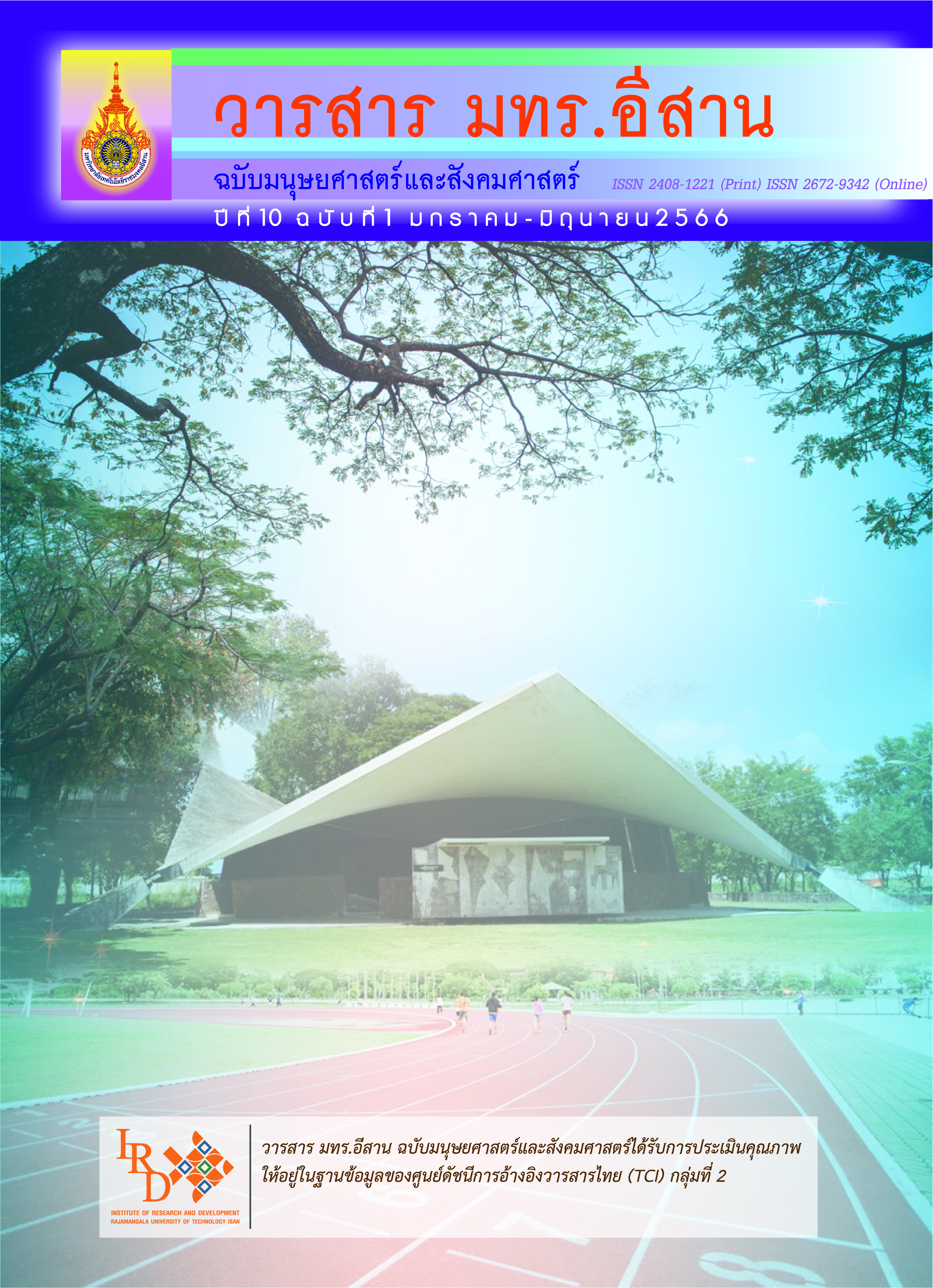A New Perspective in Human Resource Management in the Hotel Business: Generation Z Worker
Main Article Content
Abstract
This academic article aims to present a new perspective on Human Resource Management in the Hotel Business for Generation Z by pointing out their attitude towards working in the hotel business. Which emphasizes happiness in work and maintaining life balance under the definition of such a group as "Living in a world of flexibility and surrounded by technology" as well as for effective human resource management in the hotel business to keep up with the times and changing situations; the hotel business needs to have a happiness and work-life balance process that will attract this group of people to work for their organization. And relying on compensation and reward management strategies to retain these Generation Z workers in the organization for longer. In return, workers in this group will work hard which affects to work efficiency as well.
Article Details

This work is licensed under a Creative Commons Attribution-NonCommercial-NoDerivatives 4.0 International License.
บทความที่ได้รับการตีพิมพ์เป็นลิขสิทธิ์ของมหาวิทยาลัยเทคโนโลยีราชมงคลอีสาน
ข้อความที่ปรากฏในบทความแต่ละเรื่องในวารสารวิชาการเล่มนี้เป็นความคิดเห็นส่วนตัวของผู้เขียนแต่ละท่านไม่เกี่ยวข้องกับมหาวิทยาลัยเทคโนโลยีราชมงคลอีสานและคณาจารย์ท่านอื่นๆในมหาวิทยาลัยฯ แต่อย่างใด ความรับผิดชอบองค์ประกอบทั้งหมดของบทความแต่ละเรื่องเป็นของผู้เขียนแต่ละท่าน หากมีความผิดพลาดใดๆ ผู้เขียนแต่ละท่านจะรับผิดชอบบทความของตนเองแต่ผู้เดียว
References
กระทรวงการท่องเที่ยวและกีฬา. (2566). สถานการณ์การท่องเที่ยวในประเทศ รายจังหวัด ปี 2566. เข้าถึงเมื่อ (9 พฤษภาคม 2566). เข้าถึงได้จาก (https://www.mots.go.th/news/category/705)
ณภัค อินทรานนท์ และพีรเศรษฐ์ ชมภูมิ่ง. (2561). ความต้องการสวัสดิการยืดหยุ่นของพนักงานสำนักงาน กสทช. แบ่งตามเจเนอเรชั่น. วารสารวิชาการ กสทช. หน้า 193-214
ดุษฎี อิศราพฤกษ์. (2560). เจนเนอเรชั่นและแรงจูงใจที่ส่งผลต่อประสิทธิภาพการทำงาน (บริษัทญี่ปุ่นแห่งหนึ่งในนิคมอุตสาหกรรมนวนคร จังหวัดปทุมธานี). สารนิพนธ์คณะบริหารธุรกิจมหาบัณฑิต สถาบันเทคโนโลยีไทย-ญี่ปุ่น
ถิตรัตน์ พิมพาภรณ์. (2561). กลยุทธ์การจัดการความสุขในการทำงานของธุรกิจโรงแรมในประเทศไทย. วิทยานิพนธ์ หลักสูตรปรัชญาดุษฎีบัณฑิต บัณฑิตวิทยาลัย มหาวิทยาลัยศิลปากร
ภิญญาพัชญ์ นาคภิบาล. (2562). การบริหารทรัพยากรมนุษย์เชิงกลยุทธ์ และประสิทธิภาพการปฏิบัติงานของพนักงานธุรกิจโรงแรมรีสอร์ท. วารสารวิชาการสถาบันเทคโนโลยีแห่งสุวรรณภูมิ. ปีที่ 5, ฉบับที่ 1, หน้า 1-12
วฤษสพร ณัฐรุจิโรจน์. (2560). บทบาททับซ้อนของคนวัยแรงงานในครอบครัวที่มีสมาชิกพึ่งพิง. วารสารการเมืองการปกครอง. ปีที่ 7, ฉบับที่ 2, หน้า 355-372
วันวิสาข์ พลอย อินสว่าง และประสบชัย พสุนนท์. (2566). ปัจจัยเชิงกระตุ้นที่ส่งผลต่อการตัดสินใจเลือกทำงานในธุรกิจโรงแรมของกลุ่ม Generation Z ในเขตกรุงเทพมหานคร. วารสารวิทยาลัยนครราชสีมา สาขามนุษยศาสตร์และสังคมศาสตร์. ปีที่ 17, ฉบับที่ 1, หน้า 113-130
ศูนย์วิจัยกสิกรไทย. (2565). “Gen Z” First Jobber รุ่นใหม่ เพื่อเข้าใจ "ความต่าง". เข้าถึงเมื่อ (17 มกราคม 2566). เข้าถึงได้จาก (https://www.kasikornresearch.com/th/analysis/k-social-media/Pages/Gen-Z-11-08-21.aspx)
สำนักงานสถิติแห่งชาติ กระทรวงดิจิตัลเพื่อเศรษฐกิจและสังคม. (2565). การศึกษาแนวโน้มความต้องการแรงงานของตลาดแรงงานในประเทศไทย. เข้าถึงเมื่อ (17 มกราคม 2566). เข้าถึงได้จาก (http://www.nso.go.th/sites/2014/Pages)
เอิบ พงบุหงอ และสิทธิพล วิบูลย์ธนากุล. (2561). กลยุทธ์การจัดการทรัพยากรมนุษย์สำหรับบุคลากรที่มีความสามารถในอุตสาหกรรมโรงแรม. Kasem Bundit Journal. Volume 19 (Special Edition). September-October 2018. หน้า 78-89
Maslow, A. H. (1943). Motivation and Personality. (New York: Harper and Row Publisher under “A Theory of Human Motivation.” Forbes
Bencsik, A. and Machova, R. (2016). Knowledge Sharing Problems from the Viewpoint of Intergeneration Management. In ICMLG2016 - 4th International Conference on Management. Leadership and Governance: ICMLG2016. pp. 42. Academic Conferences and publishing limited
Becker, B. E., Huselid, M. A., and Ulrich, D. (2001). The HR Scorecard Linking People, Strategy and Performance. Printed in the United States of America
Bharat, C. and Rajendra, M. (2018). Generation Z Entering the Workforce: The Need for Sustainable Strategies in Maximizing Their Talent. Human Resource Management International Digest. Vol. 26, No. 4, pp. 34-38
Bunei, A. (2016). Oradiografie a Generației Z, Business Days Magazine. Access (13 December 2022). Available (https://www.businessdays.ro/blog/trenduri-oportunitati/o-radiografie-a-generatiei-z)
Mayo, E. (1924). The Social Problems of an Industrial Civilization. Boston: Graduate School of Business Administration, Harvard University
Robak, E. and Albrychiewicz-Słocińska, A. (2019). Quality of Work as a Challenge for Modern Management of Human Resources in Relation to Employees from Z-Generation. Quality Production Improvement. Vol. 1, No. 1. pp. 93-100. DOI: 10.2478/cqpi-2019-0013
O’Boyle, C., Atack, J., and Monahan, K. (2017). Generation Z Enters the Workforce. Generational and Technological Challenges in Entry-level Jobs. Deloitte Insights. Access (13 December 2022). Available (https://www2.deloitte.com/content/dam/insights/us/articles/4055_FoW-GenZentrylevel-work/4055_FoW-GenZ-entry-level-work.pdf)
Half, R. (2015). Get Ready for Generation Z. Access (13 December 2022). Available (https://www.roberthalf.com/sites/default/files/Media_Root/images/rhpdfs/rh_0715_wp_genz_nam_eng_sec.pdf)
Jayathilake, H. D. (2021). Employee Development and Retention of Generation-Z Employees in the Post-COVID-19 Workplace: A Conceptual Framework. Benchmarking: An International Journal. Vol. 28, No. 7, pp. 2343-2364. DOI: 10.1108/BIJ-06-2020-0311
Mintzberg, H. (1983). Power In and Around Organizations. Englewood Cliffs, N. J.: Prentice-Hall. 700 pages
Ognjanović, J. and Mitrović, A. (2022). Work-life Balance and Work-related Attitudes of Employees: Case Study in Serbian Hotel Industry. The European Journal of Applied Economics. Vol. 19, No. 2, pp. 114-128. DOI: 10.5937/ejae19-39093
Tarigan, J., Jordan, C., Valentine, A., Hatane, S., and Jie, F. (2021). Total Reward System, Job Satisfaction and Employee Productivity on Company Financial Performance: Evidence from Indonesian Generation Z Workers. Journal of Asia Business Studies. Vol. 16, Issue 6, DOI: 10.1108/JABS-04-2021-0154)
Lockwood, N. R. (2003). Work/life Balance: Challenges and Solutions. HR Magazine. Vol. 48, No. 6, pp. 1-11
Racolta-Paina, N. D. and Irini, R. D. (2021). Generation Z in the Workplace through the Lenses of Human Resource Professionals - A Qualitative Study. Quality - Access to Success. Vol. 22, No. 183, pp. 78-85
Robak, E. and Albrychiewicz-Słocińska, A. (2019). Quality of Work as a Challenge for Modern Management of Human Resources in Relation to Employees from Z-Generation. Quality Production Improvement - QPI. Vol. 1, No. 1, pp. 93 - 100. DOI: 10.2478/cqpi-2019-0013
Wood, S. (2013). Generation Z as Consumers: Trends and Innovation. Institute for Emerging Issues: NC State University. Access (20 December 2022). Available (https://iei.ncsu.edu/wp-content/uploads/2013/01/GenZConsumers.pdf)


